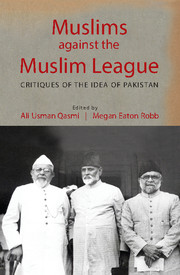Book contents
- Frontmatter
- Contents
- Acknowledgements
- Introduction
- 1 Maulana Husain Ahmad Madani and the Jami'at ‘Ulama-i- Hind: Against Pakistan, against the Muslim League
- 2 The Partition Conundrum: Perspectives, Experiences and Ambiguities from qasbahs in India
- 3 Choudhary Rahmat Ali and his Political Imagination: Pak Plan and the Continent of Dinia
- 4 Differentiating between Pakistan and Napak-istan: Maulana Abul Ala Maududi's Critique of the Muslim League and Muhammad Ali Jinnah
- 5 Advising the Army of Allah: Ashraf Ali Thanawi's Critique of the Muslim League
- 6 The Illusory Promise of Freedom: Mian Iftikhar-ud-Din and the Movement for Pakistan
- 7 Visionary of Another Politics: Inayatullah Khan ‘al-Mashriqi’ and Pakistan
- 8 Nonviolence, Pukhtunwali and Decolonization: Abdul Ghaffar Khan and the Khuda'i Khidmatgar Politics of Friendship
- 9 Islam, Communism and the Search for a Fiction
- 10 Muslim Nationalist or Nationalist Muslim? Allah Bakhsh Soomro and Muslim Politics in 1930s and 1940s Sindh
- 11 Dancing with the Enemy: Sikander Hayat Khan, Jinnah and the Vexed Question of ‘Pakistan’ in a Punjabi Unionist Context
- 12 Religion between Region and Nation: Rezaul Karim, Bengal, and Muslim Politics at the End of Empire
- 13 ‘The Pakistan that is going to be Sunnistan’: Indian Shi'a Responses to the Pakistan Movement
- 14 The Baluch Qaum of Kalat State: Challenging the Ideological and Territorial Boundaries of Pakistan
- Contributors
- Index
10 - Muslim Nationalist or Nationalist Muslim? Allah Bakhsh Soomro and Muslim Politics in 1930s and 1940s Sindh
Published online by Cambridge University Press: 28 February 2018
- Frontmatter
- Contents
- Acknowledgements
- Introduction
- 1 Maulana Husain Ahmad Madani and the Jami'at ‘Ulama-i- Hind: Against Pakistan, against the Muslim League
- 2 The Partition Conundrum: Perspectives, Experiences and Ambiguities from qasbahs in India
- 3 Choudhary Rahmat Ali and his Political Imagination: Pak Plan and the Continent of Dinia
- 4 Differentiating between Pakistan and Napak-istan: Maulana Abul Ala Maududi's Critique of the Muslim League and Muhammad Ali Jinnah
- 5 Advising the Army of Allah: Ashraf Ali Thanawi's Critique of the Muslim League
- 6 The Illusory Promise of Freedom: Mian Iftikhar-ud-Din and the Movement for Pakistan
- 7 Visionary of Another Politics: Inayatullah Khan ‘al-Mashriqi’ and Pakistan
- 8 Nonviolence, Pukhtunwali and Decolonization: Abdul Ghaffar Khan and the Khuda'i Khidmatgar Politics of Friendship
- 9 Islam, Communism and the Search for a Fiction
- 10 Muslim Nationalist or Nationalist Muslim? Allah Bakhsh Soomro and Muslim Politics in 1930s and 1940s Sindh
- 11 Dancing with the Enemy: Sikander Hayat Khan, Jinnah and the Vexed Question of ‘Pakistan’ in a Punjabi Unionist Context
- 12 Religion between Region and Nation: Rezaul Karim, Bengal, and Muslim Politics at the End of Empire
- 13 ‘The Pakistan that is going to be Sunnistan’: Indian Shi'a Responses to the Pakistan Movement
- 14 The Baluch Qaum of Kalat State: Challenging the Ideological and Territorial Boundaries of Pakistan
- Contributors
- Index
Summary
The small Muslim-majority province of Sindh occupied an ambiguous position vis-a-vis the Muslim League in the years immediately leading up to independence and the creation of Pakistan. On the one hand, the Sindh Provincial Muslim League Conference at its first session at Karachi in October 1938, presided over by Muhammad Ali Jinnah, adopted a resolution, moved by prominent local Leaguer Shaikh Abdul Majid Sindhi,recommending that the party should devise a constitutional scheme under which Muslims might attain full independence. Whatever this resolution may have signified at the time (and it is important to note that it was passed only two years after Sindh had been separated from the Bombay Presidency following an increasingly ‘communal’ campaign), it was subsequently held up by Sindhi Muslims to assert their province's key role in the wider movement to secure some kind of separate political future for the Muslims of British India. On the other hand, one of Pakistan's most vocal critics after 1947 was the Sindhi nationalist politician G. M. Syed who, after he had broken with the Muslim League by 1946, remained steadfast in his opposition to the federal arrangements on which the new Pakistani state was based, calling by the 1970s for the creation of an independent Sindh or Sindhu Desh. Moreover, observers of Sindhi Muslim politics, both contemporaries and those with the benefits of hindsight, have also frequently pointed to its highly factional nature during the late colonial period. Certainly, provincial politicking in the decade after 1936 (when Sindh was established as a separate province within British India) represented a complicated web of shifting political alliances and allegiances, within which the Muslim League occupied an uncertain place despite its improving electoral record by 1947.
This chapter, rather than exploring Syed's infamous and well-known break with the League and its bitter aftermath, focuses instead on the activities of another Sindhi Muslim politician, Allah Bakhsh Soomro, whose story is far less familiar but whose impact on provincial politics in the late 1930s and early 1940s was arguably as significant as that of his better-known counterpart during this period. One of the biggest ‘what-ifs’ of mid twentieth-century Sindhi history is to speculate on the course that politics in the province could have taken in the years immediately preceding independence had Soomro not been murdered in May 1943.
- Type
- Chapter
- Information
- Muslims against the Muslim LeagueCritiques of the Idea of Pakistan, pp. 285 - 310Publisher: Cambridge University PressPrint publication year: 2017

